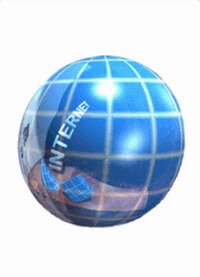TV has no wish to give unused airwaves to Internet
Television broadcasters are fighting against proposal to transmit high-speed Internet service over unused airwaves.

The National Association of Broadcasters, which is worried about possible interference with over-the-air TV programming, said TV spots will air in the Washington, D.C. area and print ads will run in Capitol Hill publications for several weeks.
The ad blitz is aimed against an initiative by a high-technology coalition that seeks federal regulatory approval for a prototype device that could transmit high-speed Internet, or broadband, service over unlicensed and unused TV spectrum, also known as "white spaces."
The technology coalition - which includes Microsoft Corp., Google Inc., Dell Inc., Hewlett-Packard Co., Intel Corp., EarthLink Inc. and Philips Electronics North America Corp., a division of Netherlands-based Royal Philips Electronics NV - said the devices could make Internet service more accessible and affordable, especially in rural areas and also spur innovation.
But the NAB, whose members include Walt Disney Co.'s ABC division and Univision Communications Inc., is fearful such devices could interfere with millions of TV sets.
"While our friends at Intel, Google and Microsoft may find system errors, computer glitches and dropped calls tolerable, broadcasters do not," said NAB Chairman Alan Frank, president of Post-Newsweek Stations, in a statement.
Broadcasters said they are not against new technology and support alternative means of providing broadband service in underserved rural areas.
In late July, the Federal Communications Commission, which is testing the prototype devices submitted by the coalition, gave them a failing grade, saying they could not reliably detect and avoid TV programming signals and could cause interference.
Two weeks later, the FCC said one of the Microsoft-built devices was broken, which accounted for the results. A duplicate Microsoft device sent to the FCC was never tested.
However, the coalition said a second prototype device developed by Phillips was able to detect both TV and wireless microphone signals, but only in a laboratory setting.
Scott Blake Harris, spokesman for the technology coalition, said in a statement Monday that the devices do work and broadband benefits are "too great to ignore."
According to its timetable, the FCC could adopt rules for operating unlicensed devices in the white-space spectrum by October and start certifying similar devices that meets its technical requirement.
David Donovan, president of the Association for Maximum Service Television, which also represents major TV broadcasters, including CBS Corp., said Monday the technology just does not work.
Because the devices would be unlicensed, meaning that the FCC would not have the power to enforce and correct any problems, Donovan said any interference would be difficult to track down and eliminate. He said thousands of such unlicensed, operating devices could pose a problem if they are not working properly.
The cable TV industry is also concerned about possible interference from the prototype devices.
The National Cable & Telecommunications Association in comments to the FCC filed Aug. 15 said inadequately shielded TV receivers and VCRs directly connected to cable systems can pick up interference from such devices operating near them. It urged the FCC to conduct more tests.
Broadcasters, who would not say how much they are spending on the ad campaign, said the consumer electronics industry and sports leagues, including Major League Baseball, National Football League, PGA Tour and others, are also joining them in their effort.
Subscribe to Pravda.Ru Telegram channel, Facebook, RSS!


